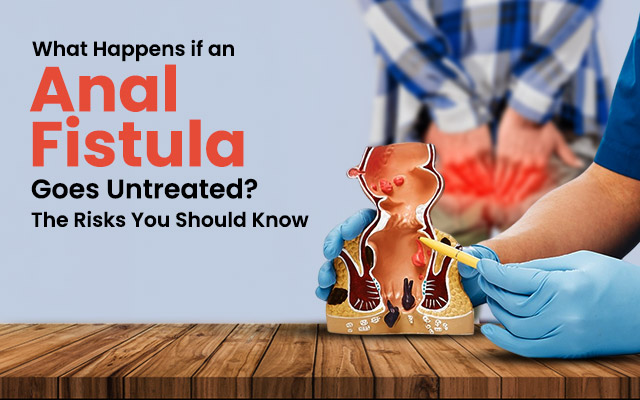An anal fistula is a common yet painful condition that can have serious consequences if left untreated. This condition involves an abnormal tunnel-like structure that forms between the skin and the anal canal. Although it may start as a minor irritation, it can develop into a significant health problem if not addressed promptly.
If you’re dealing with an anal fistula, it’s essential to consult Dr. Ashutosh Nayak, the best fistula doctor in Kolkata. It will help prevent complications and ensure a smooth recovery.
Here, we will explore the risks of leaving an anal fistula untreated and discuss the importance of early intervention. Understanding the potential complications will encourage you to seek timely treatment.
What is an Anal Fistula?

An anal fistula is a small tunnel that forms between the skin around the anus and the anal canal. It usually develops after an anal gland becomes infected and forms an abscess. The infection may drain, but it often leaves a small, persistent opening that can cause further discomfort.
The condition is painful and may be accompanied by symptoms such as swelling, discharge, itching, and bleeding. For some, the fistula causes extreme pain, especially during bowel movements. If you experience any of these symptoms, it’s essential to see a fistula doctor in Kolkata for an accurate diagnosis and treatment plan.
What Happens if You Leave an Anal Fistula Untreated?
Leaving an anal fistula untreated can lead to a series of complications. Though it might seem like a small issue initially, ignoring it can cause severe pain, infection, and long-term health problems. Here’s what can happen if you don’t seek treatment:
Chronic Infection
A persistent infection is one of the most common consequences of untreated anal fistulas. The fistula can continually drain pus and blood, causing the area to remain infected. This can lead to painful abscesses, which may become even harder to treat over time.
Increased Pain and Discomfort
Without treatment, the fistula can cause constant pain. It is true especially when sitting or during bowel movements. The discomfort can interfere with daily activities, affecting your quality of life. The pain may become severe enough to need urgent medical care.
Abscess Formation
As the infection inside the fistula spreads, it can lead to the formation of more abscesses. These abscesses are painful and can become larger. They may need more complicated treatment needs. Abscesses can also rupture, causing further tissue damage and prolonged healing.
Fistula Recurrence

Even after an abscess drains, the fistula may not heal on its own. The fistula may reopen, leading to recurrent infections and continued discomfort. Without proper intervention, the fistula may become a recurring problem. It may then require more aggressive treatments.
Sepsis Risk
In rare cases, untreated anal fistulas can lead to sepsis. It is a life-threatening infection that spreads throughout the body. Sepsis is a medical emergency and requires immediate treatment. The risk of sepsis is one of the primary reasons why early intervention is crucial.
Why Timely Treatment Matters
Early diagnosis and treatment can prevent the complications associated with anal fistulas. Seeking medical care promptly reduces the risk of infection, pain, and the development of abscesses. The best fistula doctor in Kolkata, such as Dr. Ashutosh Nayak, can offer various treatment options based on the severity of the condition.
When treated early, anal fistulas can be managed effectively. It allows patients to recover quickly without experiencing the long-term complications mentioned above. Delaying treatment can make the condition worse and increase the risk of permanent damage to the anal region.
Treatment Options for Anal Fistulas
There are several treatment options available for anal fistulas. These range from conservative approaches to surgery. The type of treatment you need will depend on the severity and complexity of the fistula. Here are some common treatment options:
Conservative Treatments
In mild cases, conservative treatments may be sufficient. These include:
- Antibiotics to treat infections.
- Sitz baths to reduce inflammation and promote healing.
- Pain relief medications for temporary relief.
But, these treatments are usually not effective in the long term. They may provide temporary relief but won’t eliminate the fistula itself.
Fistulotomy
For more severe cases, fistulotomy is the most common surgical treatment. In this procedure, the surgeon opens the fistula to allow it to heal from the inside out. This procedure has a high success rate and is typically performed under local anesthesia.
Seton Placement
A seton is a surgical thread placed inside the fistula. It helps to drain the infection and promotes gradual healing. This method is often used when the fistula is complex or near the anal sphincter.
Flap Surgery
In some cases, the surgeon may use flap surgery to close the fistula and repair any damage. This method is particularly helpful for complex fistulas and can promote quicker healing.
Ligation of Intersphincteric Fistula Tract (LIFT)
The LIFT procedure involves ligating the fistula tract to prevent infection and promote healing. This method is less invasive and has a quicker recovery time compared to traditional surgery.
Prevention Tips for Anal Fistulas
While not all anal fistulas can be prevented, following these tips can reduce the risk:
- Maintain a high-fiber diet to prevent constipation and straining during bowel movements.
- Drink plenty of water to stay hydrated and maintain regular bowel movements.
- Practice good hygiene by gently cleaning the anal area after each bowel movement.
- Seek prompt treatment for anal abscesses to prevent the development of a fistula.
Importance of Seeking Early Treatment
Chronic anal fistulas can lead to serious health problems if left untreated. They can cause constant pain, infections, and, in rare cases, life-threatening conditions like sepsis. Early diagnosis and treatment are key to preventing these complications.
Contact the Leading Fistula Doctor
If you’re experiencing symptoms of an anal fistula, don’t wait. Consult the best fistula doctor in Kolkata, Dr. Ashutosh Nayak, for affordable Swasthya Sathi treatment. Early intervention can lead to faster recovery and long-term relief. Book your appointment today and take the first step towards a healthier, pain-free life.
People Also Ask
1. What causes an anal fistula?
An anal fistula is often caused by an infection in an anal gland.
2. How long does it take to recover from anal fistula surgery?
Most patients take 4–6 weeks to recover fully from surgery.
3. Are there any home remedies for anal fistulas?
Sitz baths and pain relief medications can provide temporary relief.
4. What are the symptoms of an anal fistula?
Symptoms include pain, swelling, discharge, and bleeding near the anus.
5. Can an anal fistula cause sepsis?
Yes, if untreated, an anal fistula can lead to a life-threatening infection.
6. Can a fistula heal on its own without treatment?
In most cases, anal fistulas require medical intervention to heal completely.
7. How do doctors diagnose an anal fistula?
Doctors typically diagnose an anal fistula using physical exams, imaging tests, and ultrasound.
8. Is anal fistula surgery painful?
Post-surgery discomfort is common, but pain management options ensure a smoother recovery process.







